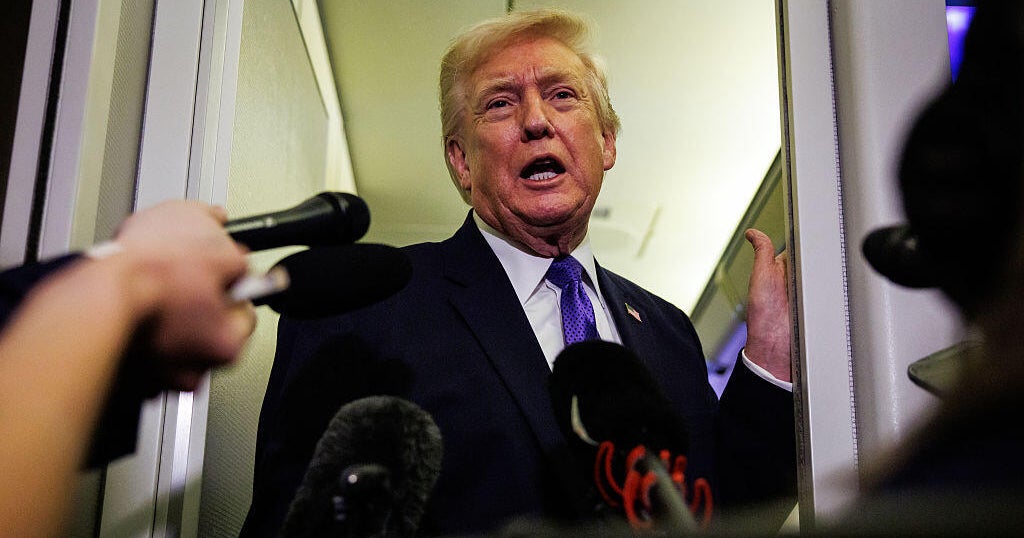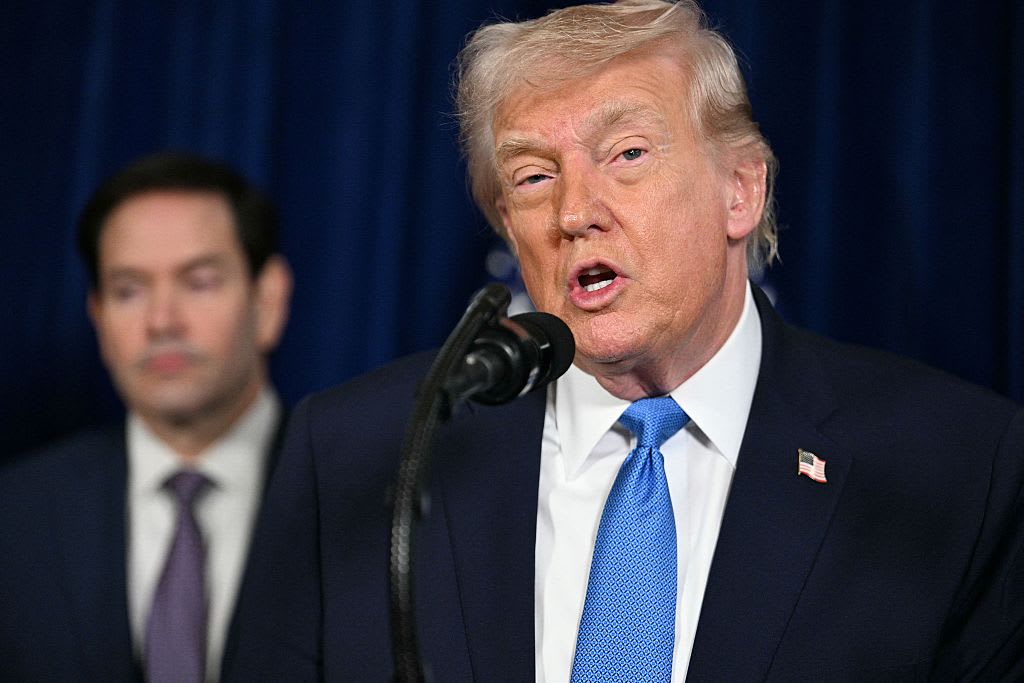Transcript: Scott Gottlieb discusses coronavirus on "Face the Nation," January 31, 2021
The following is a transcript of an interview with former FDA Commissioner Scott Gottlieb that aired January 31, 2021, on "Face the Nation."
MARGARET BRENNAN: We want to go now to former FDA commissioner Dr. Scott Gottlieb. He sits on the board of Pfizer as well as Illumina. And you all heard Governor Lamont mention him and the help he gives in his home state of Connecticut. Doctor joins us this morning from Westport, Connecticut. Good morning.
DOCTOR SCOTT GOTTLIEB: Good morning.
MARGARET BRENNAN: I thought it was remarkable there to hear a Republican mayor criticize a Republican governor in saying we- we need to actually be able to control what's happening in our own city and that not being allowed to happen. Are cities like Miami, places where they are seeing B.1.1.7, this strain in the U.K. circulate. Are they really at risk of being overrun?
DR. GOTTLIEB: I think Miami is at the highest risk right now, Miami and southern California. If you look at where B.1.1.7 is right now in the country, about half the cases that we're turning over in southern California and in Florida and the cities are the hot spots, San Diego, Miami. So I think that the possibility is that we're not going to see a national epidemic with B.1.1.7, at least in the spring and the summertime. It's a risk to the fall. But what we're likely to see is regionalized epidemics with this new variant. And the two places in the country right now that are the biggest hotspots are southern Cali- California and southern Florida, Miami. So those cities need to be very mindful of the spread of these variants. Now we know what works. Prior immunity and the vaccines do appear to be as effective against this new variant. So as we immunize more of the population and if people continue to wear masks and be vigilant in these parts of the country, we can keep this at bay. It's not too late, but it's a real risk to those regions of the country right now.
MARGARET BRENNAN: Can you clarify, because Dr. Fauci was on this program last Sunday and said that that U.K. strain does have a certain degree of increase in virulence, meaning it can cause more damage, including death. Is it more deadly?
DR. GOTTLIEB: There's some- there's some evidence right now that does suggest that it is more pathogenic, that it does cause more severe illness. And we do know that it's about 50% more transmissible. But what we also know from the data, at least the data we have so far, both experimental evidence as well as the data that's come out of some of these vaccine trials like the Johnson and Johnson vaccine trial and the one with Novavax is that immunization and prior infection appears to be protective against the B.1.1.7 variant, as protective. That's not the case with the Brazilian the South African variant P.1. and B.1.351, where prior infection, immunity you get from being infected as well as the immunity you get from vaccination, does not appear to be as protective against those variants. So the good news with B.1.1.7, if there is good news is that as we vaccinate more of the population, it should be a backstop against the continued spread of that variant.
MARGARET BRENNAN: So the Biden administration projected this week that another 90,000 people will die in the US over the next four weeks, but the curves seem to be coming down on hospitalizations and infections. Are we getting ahead of ourselves by saying we're turning a corner here? Are you warning us that these new variants are going to dramatically change this trajectory?
DR. GOTTLIEB: I think we have the potential to turn a corner. Things are clearly improving around the country. We can't take our foot off the brake too quickly in terms of the things that people are doing, like wearing masks and being more vigilant. That's really probably what's bringing down infection rates across the country right now. The new variants create a lot of risk. I think that the risk is that what you're going to see over the summertime is whereas the summer should have been very quiet, coronavirus should have really dissipated in part because of the seasonal backstop, in part because we've infected a third of the population and in part because we're immunizing more people. So coronavirus levels should have really come down this summer. You might see higher prevalence than what you would have expected. But what's going to likely happen is that the prevalence is going to be high in certain regional hotspots. So we'll have hotspots of infection and maybe epidemics in parts of Florida, parts of Southern California, because of B.1.1... They'll never really get out of it, but the rest of the country will see prevalence come down. Now, the risk is to the fall when, you know, these new variants are going to want to surge, B.1.1.7, B.1.351, P.1. Now, with respect to the South African and the Brazilian variants, they don't appear right now to be more fit, meaning that they're more transmissible. So, they may not spread as readily. And we have time to get control of those variants and develop new boosters that could protect against them, vaccine boosters.
MARGARET BRENNAN: That's what I want to ask you about, because we heard from Johnson & Johnson and Novavax that potentially their vaccines may be less effective against that strain out of South Africa. How long will it take us to get the booster shots that you say may be necessary?
DR. GOTTLIEB: Well, I think we could definitely have it in time for the fall. And we need to come up with a regulatory framework that allows the boosters to be licensed on the ability to demonstrate that they can produce antibody levels. And FDA is working on that. They've talked about developing guidance that would allow companies to develop boosters to the existing vaccines that could be licensed just on the basis of proving that in 300 or 400 patients, they can induce antibody levels at a sufficient level that are protective against these new variants. And so I think that framework is going to be mapped out and the companies have said they're already working on those new boosters. We could have them in time for the fall across all these vaccines. There's no reason we can't do that. And the platforms that the companies use to develop these vaccines, these synthetic platforms, lend themselves to those quick adaptations.
MARGARET BRENNAN: For those of us who aren't doctors, how should we understand the difference between Pfizer, Moderna and the Johnson & Johnson vaccine that seems to be headed for FDA approval?
DR. GOTTLIEB: Yeah, you know, I don't think you can make apples to apples comparisons across these clinical trials. People focused on the fact that the J&J vaccine was 72% effective in the United States at protecting against moderate to severe disease and the MRNA platforms, Moderna and Pfizer were 95% protective. And so, you know, there was a presumption that, well, maybe the J&J vaccine isn't as protective. I think that we need to look at what the vaccine is doing. It does appear that the J&J vaccine is inducing what we call a T cell response, meaning that it's protecting against disease. It might not be protecting as well against infection, but it does seem to be protecting very well against moderate to severe COVID. And in fact, in the clinical trial, no patients who received the vaccine were hospitalized or died from- from COVID. And so that's a really good outcome from the clinical trial. We also need to keep in mind that the J&J vaccine is a one dose vaccine. They have a study underway looking at two doses. So, it may well be the case that if you get two doses of that J&J vaccine, which may eventually be how we end up using it, it'll be just as protective as the other vaccines. But it's a very good development. I think it will get authorized by the FDA after a careful review, and it's going to provide a lot of additional supply on the market and some differentiation as well from the other vaccines.
MARGARET BRENNAN: How much of a difference will it make that the Biden administration is giving three weeks notice versus one week's notice to states about the doses they're going to receive?
DR. GOTTLIEB: Yeah, a lot, and the fact that they're also increasing the amount of supply that the flow into the states right now. You know, the states need to set up vaccination sites and have a predictable flow coming through those sites. They need to book appointments two, three weeks out. And so giving the states visibility on what the supply is going to be allows them to set up systems where people can go online and book an appointment two or three weeks out. A lot of people are willing to wait to get vaccinated. They just want to know when they're going to get vaccinated. So, I think giving more certainty to more people about when their time is going to come, when they can get an appointment, is going to be very important.
MARGARET BRENNAN: All right, Dr. Gottlieb, thank you for your analysis. We'll be right back.



